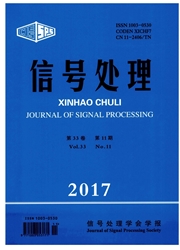

 中文摘要:
中文摘要:
针对基于训练序列的智能天线自适应干扰抑制系统,提出了一种最小二乘(Leastsquares,LS)-最小均方(Leastmeansquares,LMS)智能天线自适应干扰抑制方法,该方法首先利用小快拍数LS方法为LMS方法提供初始加权矢量,然后用LMS算法更新加权矢量。对LS、LMS和LS—LMS三种算法复杂度分析比较得知新方法的计算量较小,在快拍数较大或阵元与快拍数均较大时都能有效地提高计算效率。仿真实验表明,新方法性能优于LMS算法,具有较快的收敛速度,且收敛速度与干扰环境无关。
 英文摘要:
英文摘要:
A least mean squares (LMS) -least squares (LS) smart antenna adaptive interference suppression algorithm is proposed for the smart antenna adaptive interference suppression system based on the training sequence. The new method firstly uses small snapshot number LS method to provide initial weight vector for LMS method, then the weight vector is updated by the LMS algorithm. Through complexity analysis for the three kinds of algorithm LS, LMS and LS-LMS, the conclusion can be drawn that the computational burden of the new algorithm is smaller than the other two algorithms. When the snapshot number is large or array element and snapshot number both are large, new method can effectively improve the computational efficiency. Simulation results show that the new method outperforms LMS algorithm when the number of snapshots is few. Regardless of the interference environments, with the increasing of the number of snapshots, the new method converges to the optimal value with a faster convergence speed.
 同期刊论文项目
同期刊论文项目
 同项目期刊论文
同项目期刊论文
 Performance improvement for monostatic clutter mitigation using space-time-range three dimensional a
Performance improvement for monostatic clutter mitigation using space-time-range three dimensional a Unambiguous Doppler centroid estimation approach for SAR data based upon compressed signal magnitude
Unambiguous Doppler centroid estimation approach for SAR data based upon compressed signal magnitude 期刊信息
期刊信息
